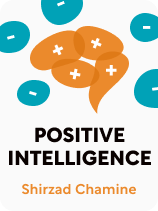

This article is an excerpt from the Shortform book guide to "Positive Intelligence" by Shirzad Chamine. Shortform has the world's best summaries and analyses of books you should be reading.
Like this article? Sign up for a free trial here.
What are the 10 Positive Intelligence Saboteurs? Which ones are causing you stress?
In Positive Intelligence, Shirzad Chamine explains that our mental antagonists, known as Saboteurs, are survival mechanisms that hinder our happiness and success in adulthood. He explains that our Saboteurs are driven by our survival brain, which exaggerates threats and causes stress.
Read on to learn how Shirzad Chamine explains Saboteurs in his book Positive Intelligence.
Positive Intelligence: Saboteurs Explained
According to Shirzad Chamine’s book Positive Intelligence, “Saboteurs” are our mental antagonists or harmful thought processes in adulthood. He claims that all stress comes from harmful thought processes that interfere with our ability to behave and reason rationally. These thought processes developed as survival mechanisms, but in adulthood, they hinder our happiness and success in every aspect of our lives.
In Positive Intelligence, Chamine claims that our brains can either work against us (i.e., our Saboteurs) or for us in promoting our happiness and success. When it works against us, it’s because the part of our brains that developed for pure survival is in charge. This part of the brain is responsible for keeping us safe from dangers to our well-being during childhood by helping us identify and avoid threats. For example, a bad grade is a threat to our academic well-being, so our survival brain might push us to study intensely to avoid that threat. However, when we become adults, the survival brain does more harm than good: It continues to exaggerate threats and push us into states of high stress over things we can overcome if we use the other part of our brain, the one that developed to help us thrive instead of just survive.
(Shortform note: Some experts distinguish the “survival brain” from the “learning brain.” They note that when your brain is in survival mode, you’re unable to focus on anything except perceived threats. People who’ve experienced trauma are likely to spend more time in the brain’s survival mode, and the more time spent in that mode, the harder it becomes to switch to learning mode. While Chamine suggests that being in survival mode during childhood is often beneficial, children can also suffer from spending too much time in survival mode because it makes it difficult to learn and thrive even in childhood. To help children enter learning mode, it’s important to give them a strong support system with healthy attachments to adults.)
In Positive Intelligence, Chamine argues that our Saboteurs represent the tendencies our brains have to cope with stress in various unhealthy ways because our brain tells us that they’re the only ways to survive that stress.
(Shortform note: Chamine’s description of Saboteurs in Positive Intelligence matches closely with the definition of cognitive distortions. Cognitive distortions are inaccurate or irrational thoughts that usually come from gut instincts and that negatively affect the way we think. In contrast to the techniques advised by Chamine, some experts recommend cognitive behavioral therapy for dealing with cognitive distortions. In the notes below, we will address some of the cognitive distortions that may fuel the Saboteurs Chamine discusses.)
Chamine adds the caveat that there are a few types of stress that are healthy: 1) the distress of mourning a loss and 2) the immediate, temporary distress that accompanies a negative event. This stress signals to you that the event could be damaging and that you need to do something to prevent further harm—like how the physical pain of using an injured limb signals you to stop using it to avoid further damage.
(Shortform note: Chamine’s caveats don’t address how we react to ongoing negative events, but research suggests that the stress from such events—such as the Covid-19 pandemic—keeps us in survival mode for long periods of time. This is because we are continuously dealing with an active threat, so surviving the threat in the short term doesn’t make our survival response turn off. This ongoing stress response can continue to keep us safe, but it has negative long-term effects on our health. To better cope with this type of event, we may have to be more accepting of stress and understand that it may take a long time for it to fade.)
Chamine explains in Positive Intelligence that there are a total of 10 Saboteurs:
- The Judge
- The Stickler
- The Pleaser
- The Hyper-Achiever
- The Victim
- The Hyper-Rational
- The Hyper-Vigilant
- The Restless
- The Controller
- The Avoider
Chamine writes in Positive Intelligence that the Judge is distinct from the other nine Saboteurs, acting somewhat as their manager. Thus, we’ll discuss the Judge first and then list the other nine with a brief description.
The Judge: The Most Powerful of the Saboteurs
The Judge is the most dominant of all the Saboteurs. The Judge passes judgment on you, on others, and on your circumstances, finding faults in all of them—while also making you think you’re just being rational and trying to fix your or others’ flaws.
Self-judgment: The Judge tells you that you’re not good enough as you are, that your level of achievement determines if you’re worthy of love, and that if you allow yourself to be satisfied with who you are, you’ll stop improving and never be good enough. It tells you that you have to suffer to make yourself better and that happiness is just laziness.
Judgment of others: The Judge sets similarly unreachable standards for other people in your life. It causes you to fixate on the Saboteurs it sees in other people. When the other person picks up that you’re judging them, their Saboteur reacts poorly, which reinforces your Judge’s assessment of them and creates a harmful cycle.
Judgment of your circumstances: The Judge also tells you that “You can only be happy when” some future event happens. In this way, it places a condition on your happiness—however, your happiness shouldn’t have a timetable and shouldn’t need to be dependent on your future circumstances. This Judge also moves the goalposts every time you get close to the thing that’s supposed to make you happy: If your Judge tells you you won’t be happy until you get a six-figure job, when you finally get that job, the Judge now fixates again on a future event that must happen before you can be happy, like getting a new vacation home or a job that pays seven figures.
The Other Saboteurs
According to Positive Intelligence, the Judge also employs one or more of the other nine types of Saboteurs to develop patterns of unhealthy stress management and thinking. Which Saboteurs these are depends on your personality and your needs.
#1. The Hyper-Achiever is driven to impress others with personal achievements in order to feel good about themselves.
#2. The Controller feels the need to control their circumstances and other people.
#3. The Stickler is a perfectionist.
#4. The Restless Saboteur is pleasure-seeking and can’t be satisfied with what they currently have.
#5. The Avoider places a disproportionate focus on positivity in order to avoid negativity.
#6. The Hyper-Rational Saboteur relies on a purely objective and rational approach to every aspect of life.
#7. The Pleaser tries to gain the approval of others by helping or flattering them, and they put the needs of others ahead of their own needs.
#8. The Hyper-Vigilant Saboteur feels constantly anxious about all the things that could go wrong and often overreacts when things do.
#9. The Victim uses emotion and a sense of martyrdom to get attention from others.
(Shortform note: Many of these Saboteurs in Positive Intelligence are fueled by different cognitive distortions, which are biases or mindsets that skew our thinking and cause us to feel bad, think negatively, and misinterpret things. Anyone can be prone to cognitive distortions. However, many of these Saboteurs also overlap with things like neurodivergent conditions and trauma responses. Chamine doesn’t address how such conditions and responses affect the Saboteurs’ influence or whether his advice applies equally to people who have them.)

———End of Preview———
Like what you just read? Read the rest of the world's best book summary and analysis of Shirzad Chamine's "Positive Intelligence" at Shortform.
Here's what you'll find in our full Positive Intelligence summary:
- The ten ways your brain sabotages your happiness and success
- How to train your brain to overcome its sabotaging behaviors
- How to increase your level of positive intelligence with attentional exercises






